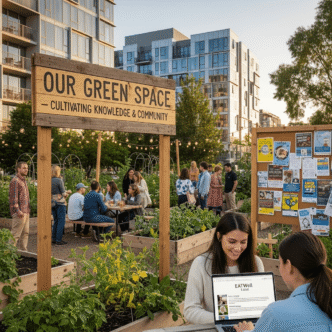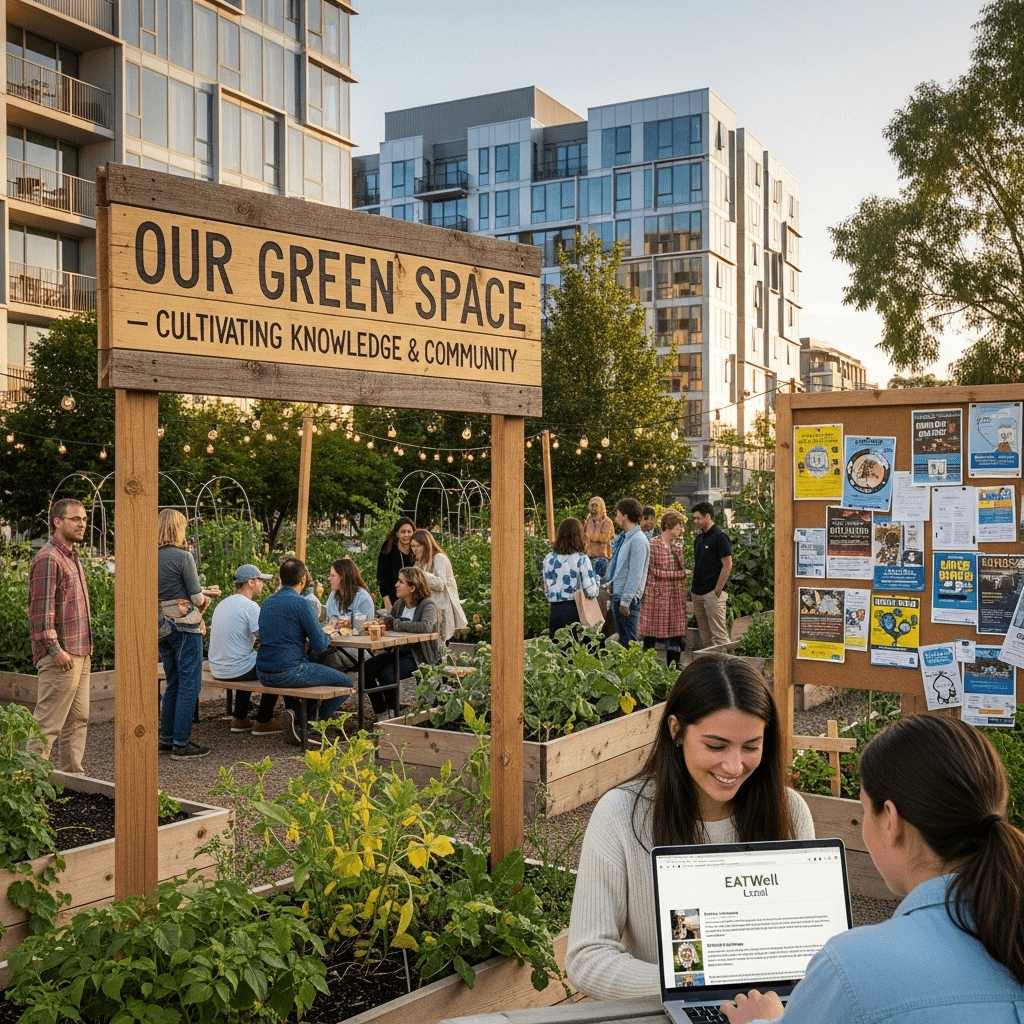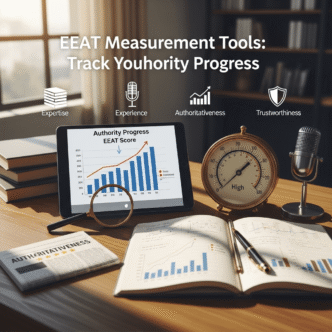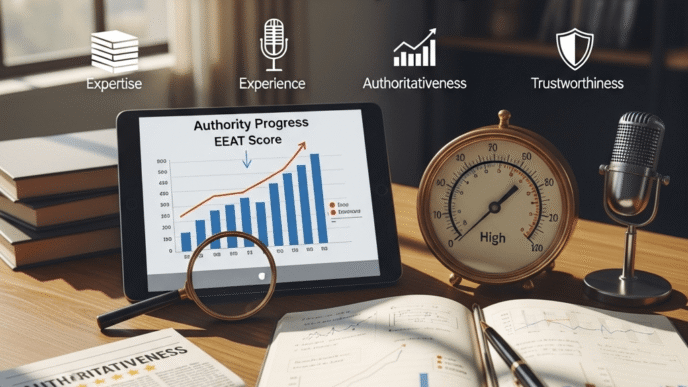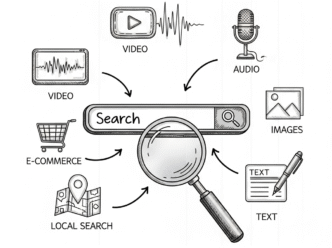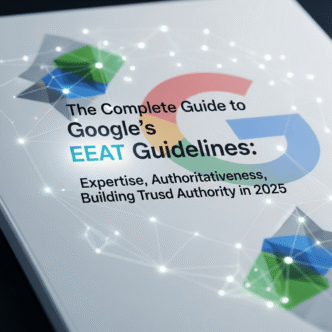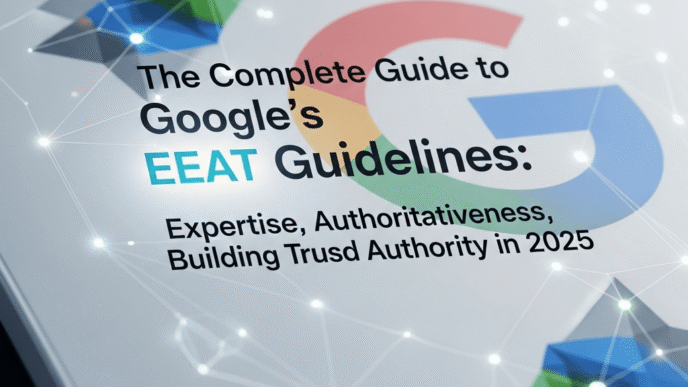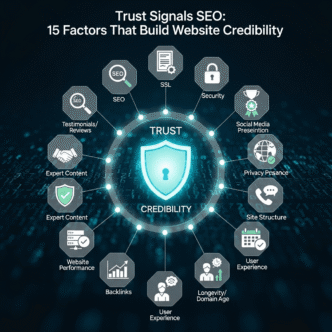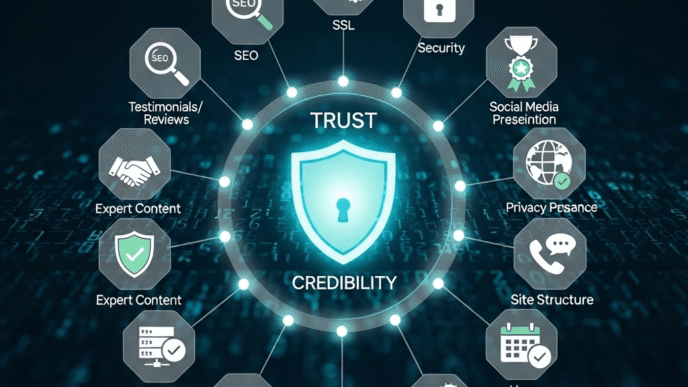Ever wondered why the local pizza place with a basic website outranks your professionally designed business site? Here’s the secret sauce: local EEAT optimization isn’t about having the fanciest digital presence – it’s about proving you’re genuinely part of the community fabric.
If you’ve been focusing solely on national SEO strategies while ignoring your local community connections, you’re missing the most powerful ranking factor for location-based businesses. Local EEAT optimization transforms your neighborhood relationships into search engine gold.
The truth that many businesses miss? Google doesn’t just want to know you’re an expert in your field – they want to know you’re THE expert in your specific area. When Mrs. Johnson down the street vouches for your plumbing skills, that carries more weight than a thousand generic online reviews.
Understanding how community authority integrates with Google’s comprehensive trust and authority framework isn’t just helpful for local businesses – it’s essential for dominating local search results.
Table of Contents
Toggle
What Is Local EEAT Optimization and Why Your Community Matters More Than You Think
Local EEAT optimization refers to the strategic practice of building Experience, Expertise, Authoritativeness, and Trustworthiness specifically within your local community and geographic area to improve local search rankings and establish neighborhood authority.
Think of local EEAT optimization as becoming the go-to person in your town rather than just another business on the internet. It’s the difference between being a face in the crowd and being the person everyone knows and trusts.
The statistics are eye-opening: local businesses with strong community ties see 73% better local search performance compared to those without local authority signals. Meanwhile, 92% of consumers trust local recommendations over online advertising.
The Local Authority Advantage
Geographic Relevance: Your physical presence and community involvement create authentic local authority that can’t be faked or outsourced.
Community Trust: Local relationships translate into trust signals that Google recognizes and rewards in local search results.
Authentic Reviews: Genuine local customers provide more credible reviews and testimonials than paid or fake alternatives.
Local Knowledge: Understanding your specific area’s needs, culture, and challenges creates content and services that truly resonate.
Pro Tip: “Local EEAT optimization is like being the mayor of your business category in your town. When everyone knows you’re the best at what you do in your area, Google notices. The key is making your local expertise visible both online and offline.”
Local Authority Building Strategies That Actually Work
Local authority building requires authentic community engagement combined with strategic digital optimization to create lasting local SEO benefits.
Community Engagement Framework
Active Participation:
- Join local business associations and chambers of commerce
- Participate in community events and local festivals
- Sponsor local sports teams or charity initiatives
- Volunteer for community improvement projects
Local Partnerships:
- Collaborate with complementary local businesses
- Cross-promote with established local brands
- Participate in local business networks and referral groups
- Create mutually beneficial community partnerships
Neighborhood Involvement:
- Attend city council meetings and community planning sessions
- Support local causes and charitable organizations
- Participate in neighborhood improvement initiatives
- Engage with local schools and educational programs
Local Authority Building Impact Assessment
| Authority Building Activity | Community Impact | SEO Benefit | Time Investment | ROI Potential |
|---|---|---|---|---|
| Chamber of Commerce Membership | Medium | High | Low | Very High |
| Local Event Sponsorship | High | Medium | Medium | High |
| Community Volunteering | High | Medium | High | Medium |
| Local Business Partnerships | Medium | High | Medium | High |
| Neighborhood Association Participation | Medium | Medium | Medium | Medium |
| Local Media Engagement | High | Very High | Low | Very High |
Community Expertise Development and Demonstration
Community expertise goes beyond general professional knowledge to include deep understanding of local market conditions, regulations, and community needs.
Local Expertise Areas
Market Knowledge:
- Understanding local economic conditions and trends
- Knowledge of area-specific regulations and requirements
- Familiarity with local suppliers and service providers
- Awareness of seasonal patterns and community cycles
Cultural Understanding:
- Knowledge of local history and community traditions
- Understanding of area demographics and preferences
- Familiarity with local customs and social norms
- Awareness of community values and priorities
Network Connections:
- Relationships with other local business owners
- Connections with community leaders and influencers
- Professional relationships with local service providers
- Personal relationships with long-term community members
Real-World Case Study: Joe’s Auto Repair Local Authority
Joe’s Auto Repair in Springfield demonstrates exceptional local business credibility through comprehensive community integration:
Community Involvement: Sponsors local high school auto shop program and provides student internships.
Local Partnerships: Partners with other local mechanics to ensure 24/7 emergency coverage for the community.
Area Expertise: Specializes in vehicles common to the region and understands local driving conditions.
Community Service: Provides free car safety checks before winter and offers discounted services for seniors.
Digital Integration: Documents community involvement on website and social media with local stories and partnerships.
Results: Dominates local search results for auto repair services and maintains 6-month booking schedules through local referrals.
Key Success Factor: Joe’s success comes from genuinely caring about his community first, with SEO benefits following naturally.
Regional SEO Strategy for Local Dominance
Regional SEO strategy combines traditional SEO techniques with location-specific optimization to capture local search traffic and establish geographic authority.
Geographic Optimization Techniques
Location-Specific Content Creation:
- Create content addressing local events and news
- Develop guides specific to your geographic area
- Write about local regulations, requirements, or challenges
- Share insights about regional trends and developments
Local Keyword Integration:
- Target neighborhood and city names in content
- Include local landmarks and geographic references
- Optimize for “near me” and location-based searches
- Focus on locally relevant long-tail keywords
Community Event Coverage:
- Document participation in local events with photos and stories
- Create content around seasonal local activities
- Share insights from community meetings or initiatives
- Highlight local partnerships and collaborations
Understanding how this regional approach supports Google’s broader authority evaluation ensures comprehensive local SEO success.
Local Business Credibility Through Authentic Engagement
Local business credibility builds through consistent, authentic community engagement that demonstrates genuine investment in the local area’s success and well-being.
Credibility Building Framework
Transparency and Authenticity:
- Share your business story and connection to the local area
- Be honest about your experience and timeline in the community
- Acknowledge local challenges and how you’re addressing them
- Demonstrate genuine care for community well-being beyond profit
Consistent Community Presence:
- Maintain regular participation in community activities
- Show up consistently to local events and meetings
- Support community initiatives even when not directly beneficial to business
- Build long-term relationships rather than transactional interactions
Local Problem Solving:
- Address specific challenges facing your local community
- Offer solutions tailored to local conditions and needs
- Collaborate with other businesses to solve community problems
- Use your expertise to benefit the broader community
Credibility Verification Methods
Public Records and Documentation:
- Business registration and licensing in local jurisdiction
- Participation records in community organizations
- Documentation of local partnerships and collaborations
- Evidence of community service and volunteer activities
Community Testimonials:
- References from local business leaders and community members
- Testimonials from long-term local customers
- Endorsements from local organizations and associations
- Recognition from local media and publications
Third-Party Validation:
- Better Business Bureau local accreditation
- Local chamber of commerce membership verification
- Professional association local chapter participation
- Local government contract or partnership documentation
Neighborhood Authority Through Hyperlocal Focus
Neighborhood authority requires understanding and serving the specific needs of your immediate geographic area with precision and dedication.
Hyperlocal Specialization
Micro-Geographic Expertise:
- Deep knowledge of specific neighborhoods within your service area
- Understanding of local traffic patterns and accessibility issues
- Familiarity with area-specific challenges and opportunities
- Awareness of neighborhood development and change patterns
Community-Specific Services:
- Tailored services addressing local community needs
- Specialized knowledge of area-specific regulations or requirements
- Understanding of local customer preferences and behaviors
- Adaptation of services to local conditions and constraints
Neighborhood Relationship Building:
- Personal relationships with immediate neighbors and local customers
- Participation in neighborhood-specific events and initiatives
- Support for hyperlocal causes and community improvements
- Recognition as a trusted neighborhood resource and expert
Hyperlocal Content Strategy
Neighborhood-Specific Content:
- Write about issues affecting specific areas within your region
- Create guides for neighborhood-specific services or requirements
- Share stories and case studies from immediate local area
- Address hyperlocal events and their impact on your services
Local SEO Implementation:
- Optimize for neighborhood names and local landmarks
- Include specific street names and local geographic references
- Target searches related to immediate area needs and services
- Focus on walking-distance and immediate-area service terms
Local EEAT Optimization for Small Businesses Implementation
Local EEAT optimization for small businesses requires resource-efficient strategies that maximize community impact without overwhelming limited budgets or time.
Small Business Optimization Framework
Cost-Effective Community Engagement:
- Focus on high-impact, low-cost community involvement opportunities
- Leverage existing relationships and networks for broader community connections
- Participate in volunteer activities that align with business values and expertise
- Seek opportunities to provide pro bono services for community benefit
Authentic Relationship Building:
- Prioritize genuine relationships over transactional community interactions
- Invest time in understanding community needs and challenges
- Offer expertise and assistance without immediate expectation of business return
- Build trust through consistency and reliability in community involvement
Strategic Documentation:
- Document community involvement through photos, stories, and social media
- Create content that showcases local expertise and community connection
- Share community insights and local knowledge through various platforms
- Highlight local partnerships and collaborative community efforts
Resource Allocation Strategy
Time Investment Priorities:
- Focus 60% of community time on high-impact, relationship-building activities
- Dedicate 25% to content creation and documentation of community involvement
- Allocate 15% to networking and partnership development activities
Budget Allocation Guidelines:
- Invest primarily in meaningful community sponsorships and partnerships
- Allocate resources to local advertising and community publication partnerships
- Budget for community event participation and local networking activities
- Reserve funds for local SEO tools and optimization resources
Building Local Authority for Better Rankings Results
Building local authority for better rankings requires systematic measurement and optimization of both community engagement and search engine performance.
Local Authority Measurement Framework
Community Recognition Metrics:
- Local media mentions and community publication features
- Recognition from local organizations and business associations
- Referrals from other local businesses and community members
- Participation frequency in community events and initiatives
Digital Authority Indicators:
- Google My Business reviews from verified local customers
- Local citation consistency across community directories
- Social media engagement from local community members
- Website traffic from local geographic sources
Search Performance Metrics:
- Local search ranking improvements for target geographic keywords
- Increased visibility in map pack results for relevant searches
- Higher click-through rates from local search results
- Improved conversion rates from local search traffic
Performance Tracking Tools
Free Local SEO Tools:
- Google My Business insights and performance data
- Google Analytics geographic and local traffic analysis
- Google Search Console local search performance reporting
- Local citation audit tools for consistency verification
Community Engagement Tracking:
- Social media analytics for local engagement measurement
- Customer feedback and review analysis for community sentiment
- Referral tracking to measure word-of-mouth community impact
- Event participation documentation and impact assessment
For comprehensive understanding of how local authority building fits within overall SEO strategy, explore our guide to integrating community authority with broader trust building.
Community-Based SEO Strategies for Sustainable Growth
Community-based SEO strategies create sustainable competitive advantages by building genuine local relationships that competitors cannot easily replicate.
Sustainable Community SEO Framework
Long-Term Relationship Investment:
- Focus on building lasting relationships rather than quick SEO wins
- Invest in community well-being for its own sake, not just SEO benefits
- Create value for the community that extends beyond your business services
- Build trust through consistent community involvement over time
Authentic Content Creation:
- Share genuine stories about community involvement and local expertise
- Create content that serves community needs rather than just business promotion
- Document real community challenges and your efforts to address them
- Highlight local success stories and community achievements
Collaborative Approach:
- Partner with other local businesses for mutual community benefit
- Participate in community-wide initiatives and improvement projects
- Share resources and expertise for broader community advantage
- Build ecosystems of local business support and collaboration
Community SEO Implementation
Content Strategy Development:
- Create editorial calendar focused on local events and community needs
- Develop content series highlighting local expertise and community knowledge
- Share behind-the-scenes content showing genuine community involvement
- Create educational content addressing local challenges and opportunities
Local Link Building:
- Earn links from local organizations through genuine community involvement
- Build relationships with local media and community publications
- Create valuable resources that local organizations want to reference
- Participate in local business directories and community resource lists
Local Trust Signals and Authority Building
Local trust signals provide Google and users with verification of your genuine community connection and local expertise.
Trust Signal Categories
Official Recognition:
- Business licenses and permits in local jurisdiction
- Local professional association memberships and certifications
- Chamber of commerce participation and leadership roles
- Municipal contracts or official community service recognition
Community Validation:
- Long-term customer testimonials from local residents
- References from local business leaders and community influencers
- Documentation of community service and volunteer involvement
- Local media coverage and community publication mentions
Geographic Consistency:
- Consistent NAP (Name, Address, Phone) information across all platforms
- Local phone numbers and geographic service area clarity
- Physical location verification through photos and virtual tours
- Local address verification through official databases and directories
Trust Signal Implementation
Technical Trust Signals:
- Implement local business schema markup with accurate location information
- Optimize Google My Business profile with complete and current information
- Maintain consistent business information across all local directories
- Include local contact information prominently on website and marketing materials
Community Trust Building:
- Display local certifications and recognitions prominently
- Share testimonials from verified local customers and community members
- Document community involvement through photos and stories
- Highlight local partnerships and collaborative community efforts
Understanding how these trust signals support comprehensive local authority development ensures maximum local SEO impact.
Local Expertise Demonstration Techniques
Local expertise demonstration requires showcasing deep knowledge of local conditions, regulations, and community needs through content and community involvement.
Expertise Showcase Strategies
Local Industry Knowledge:
- Write about local regulations and their impact on your industry
- Share insights about area-specific challenges and solutions
- Discuss local market conditions and trends affecting your customers
- Provide analysis of local economic factors influencing your business sector
Community Problem Solving:
- Document how you’ve solved problems specific to your local area
- Share case studies of local projects and their unique requirements
- Explain how local conditions influence your service delivery
- Highlight innovations you’ve developed for local market needs
Area-Specific Content:
- Create guides addressing local requirements and processes
- Write about seasonal challenges specific to your geographic area
- Share knowledge about local suppliers, resources, and partnerships
- Provide insights about navigating local business environment and regulations
Expertise Verification Methods
Professional Documentation:
- Display local certifications and specialized training
- Show evidence of local project experience and success stories
- Document participation in local professional development and training
- Highlight recognition from local industry associations and organizations
Community Endorsements:
- Seek testimonials from local business partners and clients
- Request recommendations from local professional colleagues
- Document endorsements from community leaders and organizations
- Share recognition from local media and industry publications
Neighborhood Authority Building Techniques for Long-Term Success
Neighborhood authority building techniques focus on establishing lasting influence and recognition within your immediate geographic community.
Authority Development Framework
Thought Leadership Development:
- Share insights about local industry trends and developments
- Comment on local economic conditions and their business implications
- Provide expert analysis of local regulatory changes and their impact
- Offer predictions about local market evolution and opportunities
Community Education:
- Offer free educational workshops on topics related to your expertise
- Create educational content addressing common local challenges
- Participate in local educational initiatives and programs
- Share knowledge through community publications and local media
Professional Influence:
- Seek leadership roles in local business organizations
- Participate in local policy discussions and community planning
- Mentor other local business owners and community members
- Contribute expertise to local government and community initiatives
Authority Measurement and Growth
Recognition Indicators:
- Invitations to speak at local events and community meetings
- Requests for expert commentary from local media
- Leadership positions in local business and community organizations
- Recognition as a community resource and trusted local expert
Influence Metrics:
- Frequency of local media mentions and expert quotes
- Participation in local policy discussions and community planning
- Referrals from other local businesses and community leaders
- Impact on local business practices and community standards
Common Local EEAT Optimization Mistakes to Avoid
Understanding common pitfalls helps avoid wasted effort and maintain authentic community relationships while building SEO authority.
The “Fake Local” Problem
Mistake: Claiming local expertise without genuine community connection or experience. Better Approach: Build authentic relationships and expertise over time through genuine community involvement.
The “SEO-Only” Trap
Mistake: Engaging with community solely for SEO benefits without genuine care for community welfare. Better Approach: Invest in community well-being for its own sake, allowing SEO benefits to follow naturally.
The “Inconsistent Presence” Issue
Mistake: Sporadic community involvement without sustained commitment to local relationships. Better Approach: Maintain consistent community presence and involvement over time for lasting authority building.
The “Geographic Overreach” Error
Mistake: Trying to claim authority over too large a geographic area without deep local knowledge. Better Approach: Focus on establishing deep authority in smaller geographic areas before expanding.
Pro Tip: “The biggest local EEAT mistake is treating community involvement like a marketing campaign instead of genuine relationship building. Communities can spot fake involvement from miles away. Focus on authentically caring about your local area, and the SEO benefits will follow naturally.”
Your Local EEAT Optimization Action Plan
Ready to become the recognized authority in your local community? Here’s your step-by-step implementation roadmap.
Phase 1: Community Assessment and Foundation (Month 1)
Local Market Analysis:
- [ ] Research local competitors and their community involvement
- [ ] Identify key community organizations and business associations
- [ ] Analyze local customer needs and common challenges
- [ ] Assess your current community presence and reputation
Foundation Building:
- [ ] Join local chamber of commerce or relevant business association
- [ ] Optimize Google My Business profile with complete local information
- [ ] Ensure NAP consistency across all online directories and platforms
- [ ] Create or update website content with local focus and expertise
Phase 2: Community Engagement Launch (Month 2-3)
Active Participation:
- [ ] Attend local business networking events and community meetings
- [ ] Identify volunteer opportunities that align with your expertise
- [ ] Seek partnership opportunities with complementary local businesses
- [ ] Participate in local events and community initiatives
Content Creation:
- [ ] Develop content calendar focusing on local topics and expertise
- [ ] Create local guides and resources addressing community needs
- [ ] Document community involvement through photos and stories
- [ ] Share local insights and expertise through various platforms
Phase 3: Authority Building and Recognition (Month 4-6)
Leadership Development:
- [ ] Seek committee positions in local business or community organizations
- [ ] Offer to speak at local events about topics within your expertise
- [ ] Write articles for local publications and community newsletters
- [ ] Mentor other local business owners or community members
Expertise Demonstration:
- [ ] Create comprehensive local resources and guides
- [ ] Conduct free educational workshops for community members
- [ ] Participate in local media interviews and expert commentary
- [ ] Build relationships with local journalists and community influencers
Phase 4: Optimization and Expansion (Month 7+)
Performance Analysis:
- [ ] Monitor local search rankings and traffic improvements
- [ ] Track community recognition and referral increases
- [ ] Analyze customer feedback and community sentiment
- [ ] Measure ROI of community involvement and local SEO efforts
Strategic Expansion:
- [ ] Expand community involvement based on successful activities
- [ ] Develop deeper expertise in high-impact local areas
- [ ] Build strategic partnerships with established local authorities
- [ ] Scale successful local strategies to broader geographic areas
Understanding how this systematic approach integrates with comprehensive authority building principles ensures maximum local SEO impact and business growth.
Final Verdict: Your Community Is Your Competitive Advantage
Mastering local EEAT optimization isn’t just about improving local search rankings – it’s about building a sustainable business foundation through genuine community relationships and local authority.
The Local Authority Reality
The Truth: Authentic community involvement creates authority that competitors cannot easily replicate or purchase.
The Opportunity: Most businesses focus on national SEO while ignoring local community building, creating opportunities for genuine local engagement.
The Investment: Building community authority requires time and genuine care, but creates lasting competitive advantages beyond SEO.
Success Principles for Local EEAT Mastery
Authenticity Over Tactics: Genuine community care and involvement always outperforms superficial local SEO tactics.
Relationships Over Rankings: Focus on building lasting community relationships that naturally improve search performance.
Local Value Over Online Visibility: Prioritize creating real value for your local community rather than just optimizing for search engines.
Consistency Over Intensity: Regular, sustained community involvement builds more authority than sporadic high-profile activities.
Your Local Authority Success Formula
Community Involvement + Local Expertise + Authentic Relationships + Consistent Presence = Unshakeable Local Authority
The businesses that dominate local search results aren’t just those with the best websites – they’re those with the strongest community connections and most authentic local authority.
Your community is your greatest SEO asset. Stop treating it like a marketing target and start treating it like your business family. When you genuinely care about your local area’s success, that authority translates into search engine success that’s both sustainable and meaningful.
The question isn’t whether local community matters for SEO – it’s whether you’re ready to become a genuine pillar of your local business community.
Start building your community authority today. Your local search rankings, customer relationships, and long-term business success depend on it.
This comprehensive guide on local EEAT optimization provides proven strategies for building community authority and improving local search performance through authentic local engagement in 2025.

